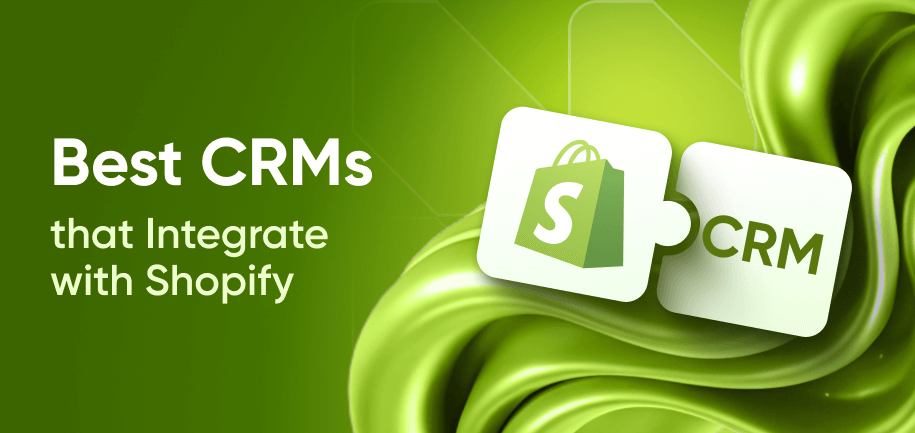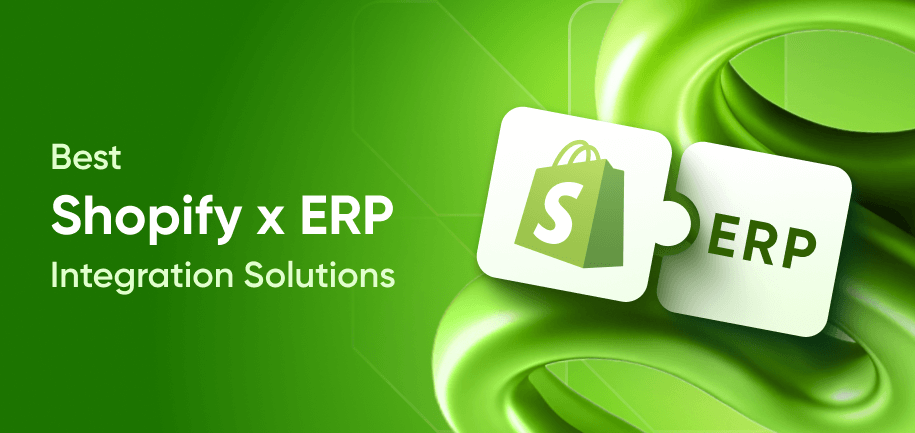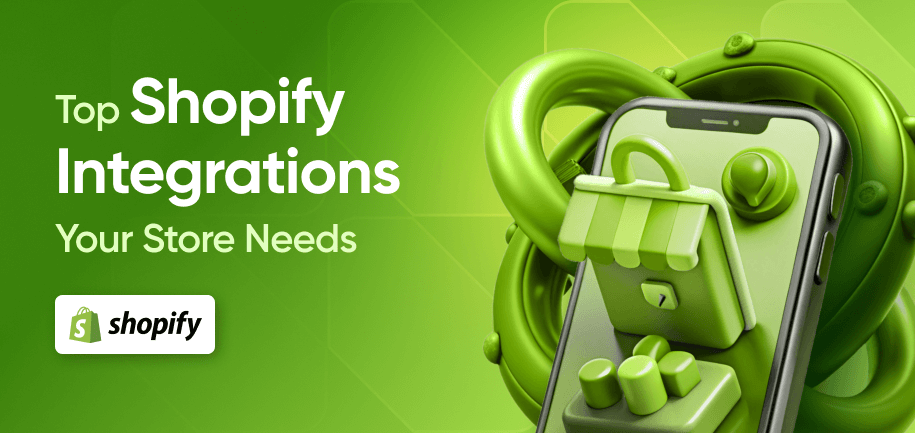When you're running an e-commerce business, building lasting relationships with your customers is essential for growth and success. One of the most powerful ways to manage and nurture those relationships is by using a customer relationship management (CRM) system.
A good Shopify CRM can help automate marketing tasks, keep track of customer interactions, and provide detailed insights into customer behavior, all of which can significantly improve your store's performance.
Integrating your Shopify CRM system with your online store allows you to centralize your customer data, streamline workflows, and improve your marketing and sales strategies. In this post, we’ll cover the 10 best CRM with Shopify integrations, how they work, and why you should consider implementing them for your business.
1. HubSpot CRM
HubSpot is one of the most popular CRM platforms globally, known for its user-friendly interface and robust integration with Shopify CRM software. With HubSpot’s integration, you can manage your customer relationships seamlessly, track sales activity, and automate marketing campaigns. This CRM offers everything from lead nurturing to customer service, helping your business provide exceptional customer support.
Features
Email Automation: HubSpot allows you to set up automated email campaigns based on customer activity.
Segmentation: Segment customers based on their buying behaviors, demographics, or preferences.
Customer Analytics: Gain in-depth insights into customer interactions with detailed reports and dashboards.
Lead Scoring: Track and score leads to prioritize your most valuable customers.
Why It’s Great for Shopify
HubSpot integrates easily with Shopify CRM apps, helping store owners synchronize customer data and track sales performance in real-time. The integration provides a 360-degree view of customer interactions, helping you craft more personalized experiences for your audience.
2. Zoho CRM
Zoho CRM is a feature-rich platform with a suite of tools that can be fully integrated with Shopify. This CRM helps automate key processes such as sales, marketing, and customer service. It’s ideal for e-commerce businesses looking to boost their productivity and improve customer interactions.
Features
Automation: Zoho CRM automates routine tasks such as follow-ups, notifications, and emails.
Omnichannel Communication: Communicate with your customers via email, chat, social media, and even phone, all within one platform.
Sales Pipeline Management: Visualize your sales pipeline and prioritize leads accordingly.
Customer Analytics: Analyze customer behavior and preferences for more targeted marketing strategies.
Why It’s Great for Shopify
Zoho CRM’s Shopify CRM integration allows you to track customer interactions and make data-driven decisions. The integration helps to centralize your customer data, streamline communication, and track sales without switching between multiple tools.
3. Klaviyo
Klaviyo is primarily known as an email marketing tool, but it also doubles as a robust CRM solution with powerful Shopify CRM integration. It's especially beneficial for e-commerce businesses looking to build long-term relationships with their customers through personalized, data-driven email campaigns.
Features
Advanced Segmentation: Use customer data to create highly targeted email campaigns.
Automation Flows: Set up automated email flows for cart abandonment, welcome emails, and post-purchase follow-ups.
Data-Driven Insights: Track customer behavior and segment them accordingly for better targeting.
SMS Marketing: In addition to email, Klaviyo also supports SMS marketing to keep your customers engaged.
Why It’s Great for Shopify
The Shopify CRM apps that integrate with Klaviyo provide a seamless experience, ensuring that you can use your customer data effectively for tailored marketing campaigns. It’s an excellent choice for businesses looking to nurture their customer relationships through personalized marketing efforts.
4. ActiveCampaign
ActiveCampaign is a customer experience automation platform that offers a strong Shopify CRM system integration. It’s ideal for businesses that want to combine email marketing, CRM, and sales automation under one roof. ActiveCampaign helps deliver personalized customer experiences by automating the communication process based on behavior.
Features
Automated Email Campaigns: Create and send automated emails based on customer actions, such as product views or cart abandonment.
Sales Automation: Automatically assign tasks to sales reps based on customer activity.
Behavioral Tracking: Track how customers interact with your site to tailor communication.
Custom Reports: Use detailed reports to measure campaign success and optimize your strategy.
Why It’s Great for Shopify
The integration between ActiveCampaign and Shopify allows businesses to take full advantage of customer data to create more targeted and personalized communication. By using this CRM with Shopify, you’ll be able to streamline your sales and marketing efforts and improve customer satisfaction.
5. Salesforce
Salesforce is a leading CRM platform used by businesses of all sizes. It offers extensive integration with Shopify, making it a top choice for enterprise-level companies. With Salesforce, you can manage your sales pipeline, track customer activity, and automate your workflows.
Features
Customizable Dashboards: Salesforce allows you to create dashboards tailored to your business needs.
Marketing Automation: Automate lead nurturing, email campaigns, and customer follow-ups.
Collaboration Tools: Enable your team to collaborate on leads, opportunities, and sales tasks.
Real-Time Analytics: Get real-time insights into customer interactions and sales performance.
Why It’s Great for Shopify
The Shopify CRM integration with Salesforce ensures that customer data from your store is seamlessly synchronized, allowing for a more personalized approach to sales and marketing. It’s particularly suited for businesses with large customer bases and complex sales processes.
6. Pipedrive
Pipedrive is an intuitive CRM designed to help sales teams stay organized and increase their productivity. It integrates effortlessly with Shopify, making it easy for e-commerce businesses to track customer activity, manage sales, and boost customer retention.
Features
Sales Pipeline Visualization: Visualize your entire sales process, from leads to conversions.
Automation: Automate repetitive tasks such as emails, reminders, and follow-ups.
Advanced Reporting: Gain insights into sales performance with customizable reports.
Customer Relationship Management: Maintain detailed customer profiles to enhance interactions.
Why It’s Great for Shopify
Pipedrive’s Shopify CRM integration makes it easy to track leads and sales directly within your CRM. By synchronizing customer data from Shopify, Pipedrive ensures that your team has all the information they need to close deals faster and more effectively.
7. Freshworks CRM
Freshworks CRM (formerly Freshsales) is a user-friendly CRM that helps businesses manage their customer relationships more efficiently. It integrates seamlessly with Shopify to provide a full customer profile, automate workflows, and streamline communication.
Features
Lead Scoring: Prioritize leads based on their likelihood of converting.
Automation: Automate tasks like follow-up emails and sales reminders.
360-Degree Customer View: Get a complete view of each customer’s interactions with your business.
AI-Powered Insights: Use AI to predict customer behavior and optimize your sales strategy.
Why It’s Great for Shopify
Freshworks CRM’s integration with Shopify CRM apps ensures that all customer information, including order history, contact details, and engagement data, is synced across both platforms. This leads to better decision-making and more effective customer relationship management.
8. Agile CRM
Agile CRM is a cost-effective solution for small and medium-sized businesses that need a simple yet effective way to manage customer relationships. With a powerful Shopify CRM integration, Agile CRM offers marketing automation, sales tracking, and customer service tools all in one platform.
Features
Email Marketing: Create targeted email campaigns with ease.
Sales Tracking: Track your sales and conversions in real time.
Pipeline Management: Organize your sales process and manage leads efficiently.
Customer Segmentation: Segment customers based on behavior and interactions for better targeting.
Why It’s Great for Shopify
Agile CRM’s Shopify CRM integration allows e-commerce businesses to manage their customer data more effectively. The integration ensures that you can automatically add new customers and track their purchasing behavior, making it easier to engage with them through personalized marketing.
9. Nimble
Nimble is a simple yet powerful CRM that offers seamless integration with Shopify. It is designed for small businesses and solopreneurs who want to streamline their customer relationship management process without the complexity of larger CRM systems.
Features
Contact Management: Manage and segment your contacts in a centralized database.
Social Media Integration: Keep track of customer interactions across social media platforms.
Activity Tracking: Monitor customer activity to stay on top of leads and sales opportunities.
Mobile App: Stay connected with customers on the go with Nimble’s mobile app.
Why It’s Great for Shopify
With Nimble’s Shopify CRM system integration, you can track customer interactions and social media activity in one place. This helps provide a more holistic view of your customers and allows you to engage with them in a more meaningful way.
10. Keap (formerly Infusionsoft)
Keap is a CRM and marketing automation platform designed to help businesses streamline their marketing and sales processes. It integrates with Shopify, allowing you to automate customer interactions and manage your relationships more efficiently.
Features
Marketing Automation: Automate email campaigns, follow-ups, and promotions.
Lead Management: Track leads and manage sales opportunities with ease.
Customizable Workflows: Create custom workflows based on customer actions and behaviors.
Analytics: Get detailed reports to track the effectiveness of your campaigns.
Why It’s Great for Shopify
Keap’s Shopify CRM integration allows you to create automated customer journeys and manage sales pipelines effectively. This integration makes it easy to convert leads into customers by automating marketing efforts and customer engagement.
Why Your Shopify Store Needs a CRM
As an e-commerce store owner, managing and nurturing customer relationships is critical to your business's long-term success. A Shopify CRM is a powerful tool that can help streamline customer interactions and improve overall business efficiency. By using a CRM integrated with Shopify, you gain access to insights that allow for personalized marketing, automated workflows, and better customer support. Without a CRM, you risk losing track of valuable customer data, which could hinder your ability to make informed decisions and scale your business.
Advantages of Using a CRM with Your Shopify Store
Integrating a Shopify CRM system into your store offers several advantages that can significantly enhance your e-commerce business. These benefits include:
Streamlined Customer Data Management: Centralize customer information in one place, making it easy to access and analyze.
Automation of Key Processes: Automate tasks like follow-ups, emails, and notifications, saving time and reducing human error.
Improved Customer Engagement: Build more personalized relationships with your customers through targeted communication and offers.
Increased Sales and Conversions: By understanding customer behavior, you can optimize marketing efforts and increase conversion rates.
Better Customer Support: With a CRM, customer service teams can access detailed customer histories, allowing for faster and more effective support.
Enhanced Reporting and Insights: Track sales performance and customer interactions with advanced reporting tools for better decision-making.
Key Features to Consider When Selecting a Shopify CRM
When choosing a Shopify CRM, consider these essential features to ensure the system meets your business needs:
Seamless Shopify CRM Integration: Ensure the CRM integrates smoothly with your Shopify store for easy data synchronization.
Customer Segmentation: The ability to group customers based on behavior, demographics, or purchase history to tailor marketing efforts.
Automation Capabilities: Look for features that automate tasks such as email follow-ups, order tracking, and customer outreach.
Advanced Reporting Tools: Access detailed insights into customer activity, sales trends, and marketing campaign performance.
Multi-Channel Communication: Choose a CRM that allows you to interact with customers across multiple channels such as email, SMS, and social media.
Customizable Workflows: The ability to create custom workflows based on customer actions or specific business needs.
Scalability: Ensure the CRM can grow with your business as your customer base and product offerings expand.
Why Choose Amasty for Shopify Integration
While there are numerous CRM tools that can integrate with Shopify, the key to successfully managing your Shopify customer relationship management lies in finding a CRM solution that aligns with your business goals. If you're looking for expert help with Shopify CRM integration, look no further than Amasty's Shopify integration service.
Amasty offers comprehensive Shopify integration solutions tailored to your business needs, ensuring seamless synchronization of your Shopify CRM system with your e-commerce store. With their expertise, you can improve your sales processes, enhance customer experiences, and maximize your Shopify store's potential.
Frequently asked questions
No, Shopify does not have a built-in CRM. However, Shopify can integrate seamlessly with a variety of third-party CRMs like HubSpot, Salesforce, and Zoho, allowing you to manage customer data, automate workflows, and gain insights into your customers' behaviors.
Shopify is primarily an e-commerce platform (CMS) designed for creating and managing online stores. While it provides tools for managing products, orders, and customers, it does not offer full-fledged CRM functionality. However, it can integrate with CRMs to enhance customer relationship management.
The best CRM for e-commerce depends on your store’s needs, but some popular options that integrate well with Shopify include HubSpot, Zoho CRM, and Klaviyo. These CRMs offer powerful tools for email automation, customer segmentation, and sales tracking, which can help e-commerce stores boost customer engagement and increase sales.
The four main types of CRM systems are:
Operational CRM: Focuses on automating business processes like sales, marketing, and customer service.
Analytical CRM: Analyzes customer data to provide insights and improve decision-making.
Collaborative CRM: Enables communication and collaboration between teams to improve customer service.
Campaign Management CRM: Specializes in managing marketing campaigns and customer outreach efforts.


















